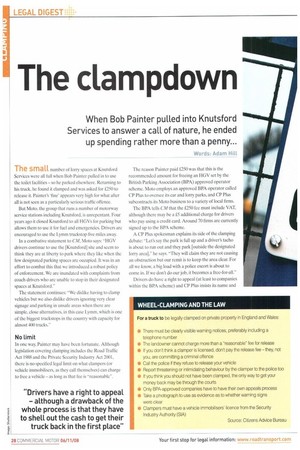The clampdown
Page 28

If you've noticed an error in this article please click here to report it so we can fix it.
When Bob Painter pulled into Knutsford Services to answer a call, of nature, he ended up spending rather more than a penny...
Words: Adam Hill The small number of lorry spaces at Knutsford Services were all full when Bob Painter pulled in to use the toilet facilities — so he parked elsewhere. Returning to his truck, he found it clamped and was asked for £250 to release it. Painter's 'fine' appears very high for what after all is not seen as a particularly serious traffic offence.
But Moto, the group that runs a number of motorway service stations including Knutsford, is unrepentant. Four years ago it closed Knutsford to all HGVs for parking but allows them to use it for fuel and emergencies. Drivers are encouraged to use the Lymm truckstop five miles away.
In a combative statement to CM, Moto says: "HGV drivers continue to use the 1Knutsfordi site and seem to think they are at liberty to park where they like when the few designated parking spaces are occupied. It was in an effort to combat this that we introduced a robust policy of enforcement. We arc inundated with complaints from coach drivers who arc unable to stop in their designated spaces at Knutsford."
The statement continues: "We dislike having to clamp vehicles but we also dislike drivers ignoring very clear signage and parking in unsafe areas when there are simple, close alternatives, in this case Lymm, which is one of the biggest truckstops in the country with capacity for almost 400 trucks.
No limit
In one way, Painter may have been fortunate. Although legislation covering clamping includes the Road Traffic Act 1988 and the Private Security Industry Act 2001, there is no specified legal limit on what dampers (or vehicle immobilisers. as they call themselves) can charge to free a vehicle — as long as that fee is "reasonable". The reason Painter paid 1250 was that this is the recommended amount for freeing an HGV set by the British Parking Association (BPA) approved operator scheme. Moto employs an approved BPA operator called CP Plus to oversee its car and lorry parks, and CP Plus subcontracts its Moto business to a variety of local firms.
The BPA tells CM that the £250 fee must include VAT, although there may be a £5 additional charge for drivers who pay using a credit card. Around 70 firms are currently signed up to the BPA scheme.
A CP Plus spokesman explains its side of the clamping debate: "Let's say the park is full up and a driver's tacho is about to run out and they park [outside the designated lorry area]," he says. "They will claim they are not causing an obstruction but our remit is to keep the area clear. For all we know, a big load with a police escort is about to come in. If we don't do our job, it becomes a free-for-all."
Drivers do have a right to appeal (at least to companies within the BPA scheme) and CP Plus insists its name and




























































































































































